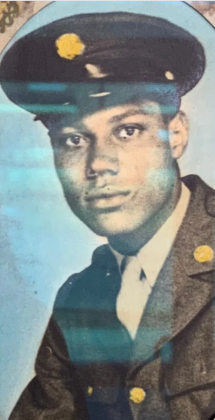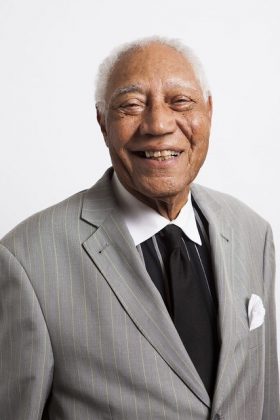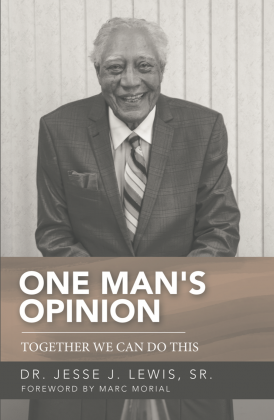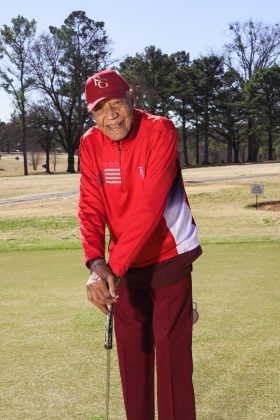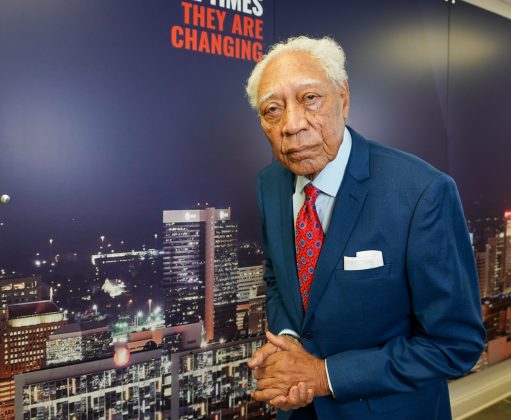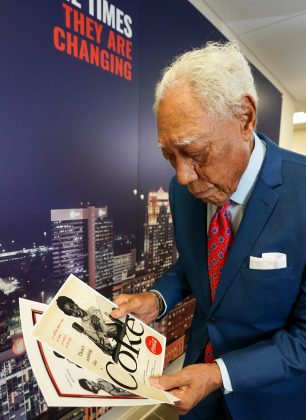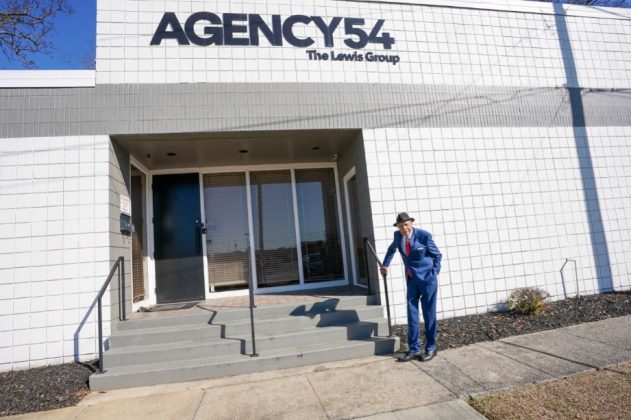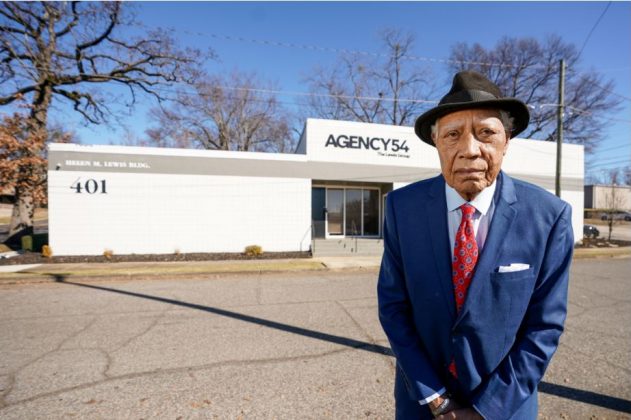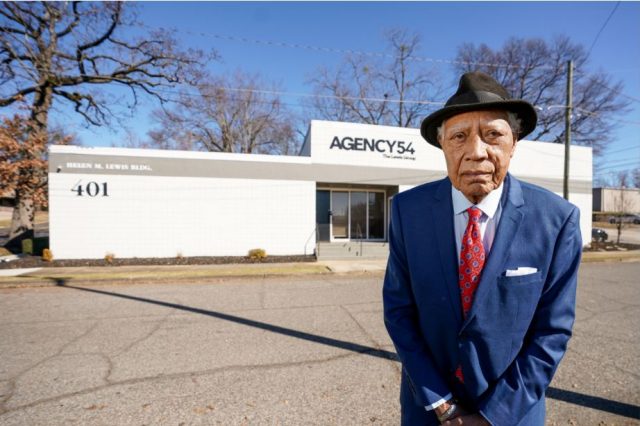
By Barnett Wright
The Birmingham Times
Legendary businessman Dr. Jesse J. Lewis Sr. smoothly makes the 20-minute drive from Birmingham’s historic Smithfield neighborhood, where he lives, to the Roebuck Municipal Golf Course on a chilly late January morning, two weeks after his 96th birthday.
Once at the course—which he leases from the city of Birmingham, one of his numerous business endeavors—he cranks up one of the golf carts, loads his bag of clubs and drivers, and heads to a nearby hole where he puts his ball-striking skills on display. It doesn’t take long for him or the cold winter sun to warm up. Soon the man known as “Doc” is sinking putt after putt with the ease of a professional tournament champion.
His drive is legendary—not just on the course but as an entrepreneur who has owned or been part of at least 17 different businesses, including ventures in real estate, a recording studio, music publishing, a golf course, radio and television stations, grocery stores, and night clubs.
“And I’ve been successful in all of them,” Lewis said. “I either sold, leased, or gave most of them away, but I always end up making a positive number of dollars from all of my investments.”
Lewis’s autobiography, “One Man’s Opinion: Together We Can Do This,” (2020) is fitting for Black History Month, given all he has done and continues to accomplish four years short of becoming a centenarian. He can still be found overseeing his vast real estate portfolio in his office at the Jesse J. Lewis Jr. Tech Center on the west side of Birmingham, located next door to the Birmingham Times newspaper, which he founded in 1963 and sold in 2015.
Lewis is a military veteran who once served in a battalion headed by U.S. Army Gen. George S. Patton, one of America’s most renowned military figures. He also was a political appointee who once served in a cabinet headed by former Alabama Gov. George Wallace, who became one of Lewis’s lifelong friends.
The business icon is a high school dropout who went on to earn five degrees, including a doctorate, become a college president, and establish the oldest Black-owned advertising and public relations firm in America. Today he shows no signs of slowing down.
“I read an article that said the greatest question you can ask yourself is, ‘Why were you born?’ My greatest answer to this question is, ‘God has put me here to help take my Black people to another level.’”
Lewis leaves the golf course and heads to his office at the Tech Center, where he has agreed to sit for an interview with the Birmingham Times. For the next hour, the man inducted into the Birmingham Business Hall of Fame in 2019 recalls minute details of his childhood, education, work history, family, businesses, and, of course, his love for golf—displaying amazing recollection for a man who was born when President Calvin Coolidge was in office and continues to show up for work at the dawn of President Joseph Biden’s first term.
“Jesse James Lewis”
“When I grew up there were no doctors around in our community, no dentists, and I never saw running water or had a toothbrush until I was in the military service,” he writes in his 177-page book. “I am shocked that as I write this book, at age 95 [at the time], I still have all of my teeth in perfect condition. I brush my teeth about five times a day now and take a bath about three times a day.”
Lewis was reared by his grandmother, Sarah Davis. According to her, he was born Jesse James Terror in Northport, Alabama, on Jan. 3, 1925.
“In that time that I was born, there were no birth records kept for Blacks,” he writes. “There were no courthouses or hospitals if you were Black. My mother lived in Fayette, Alabama, and came to Northport one year and picked me up. Six months later, she dropped me back off at my grandmother’s and changed my name to Jesse James Lewis.”
During the interview, Lewis remembered that his grandmother raised five children, including him; he was the oldest. All were expected to find odd jobs to make pennies and nickels to contribute toward the family’s survival—and this was before they turned 10.
“Every day, you had to figure out how you were going to bring home a little piece of money,” he said. “It didn’t have to be much, … which means you had to go by some store to help clean up. You had to go by somebody’s house to fix something or clean up something. I went by the railroad, where you had to put crossties up on the track. You got a penny apiece for every one you put up there, so I made sure I made a dollar every day.”
Grandma’s Hands
Lewis and the other children lived in a small, three-bedroom shotgun house. His larger-than-life grandmother had the children do two things every day, he said: “The first was to pray and thank God for what you had. The second was to sit down for Bible study,” he remembered.
“Everything in the Bible was the law. This is what God wrote, and this is what he wanted you to do. There were some words I couldn’t read, but I would read the word before and the word after and try to get an idea of the meaning of the word I didn’t understand.”
As Lewis matured, he learned something else about his grandmother: she couldn’t read or write.
“The reason why I know that is one day one of the kids couldn’t understand the scripture and she asked [grandma] to read it,” he said. “She had to ask me. She didn’t want us to know that she couldn’t read. She made us sit down at night and the one who could read the best read to the rest of us.”
Even now, Lewis thinks about his grandmother.
“Here was a woman who probably went to school at the most 10 days during her lifetime,” he writes in his book. “She would be amazed to see her ‘Little Jesse’ having five degrees hanging on his office wall, and the one which I am most proud of is my high school certificate.”
Lewis’s degrees include a Bachelor of Science in business administration from Miles College, a Master of Science in criminal justice from Troy State University, and a Doctor of Education from Atlanta University, which would become Clark Atlanta University.
Military Service
After Lewis completed 10th grade, he dropped out of school to enter the military, where he served from 1942 to 1945.
“While in the military, I served in the 183rd Engineering Combat Battalion under Gen. George S. Patton, who was my Army commanding officer,” he writes in his book.
During his time in the military, Lewis embarked on the first of his many business ventures.
“I cleaned and pressed shirts and trousers for my fellow servicemen and would charge them by the month, either $1 or $2, because none of them had any money until they got their checks,” he said. “This little money came in handy because I would send all of my service pay back home to support my grandmother in Alabama.”
After three years in the military and an honorable discharge, Lewis headed back Alabama, where he accepted a job for a rubber company in Tuscaloosa and worked for two years before being fired. That led him to start his own business. “That way if anybody would ever fire me, it would be me,” he said.
Lewis was terminated from the rubber company because he “voiced his opinion against segregated restrooms, against Black workers not having air conditioning in the summer months nor heat in the winter,” he writes in “One Man’s Opinion.” “I even took it a step further and attempted to form a union in order to get equal working conditions and equal pay for Black workers, the same as the whites.”
Once management found out, they were outraged, Lewis writes: “They didn’t kill me, but they did fire me.”
After losing his job he found his way to Birmingham and landed a job with the Coca-Cola Beverage Company, which hired him to do brand marketing.
“I was the first Black person the Coca-Cola Company ever hired to represent them,” he said. “I did the first ad with the Coca-Cola Company involving a Black person, the first one in the history of Cola-Cola. … It was on national, TV, radio. … In that job, I learned a lot and gained a deep passion for the marketing industry. My life took a turn toward this path, and the rest has made me who I am today.”
George Wallace
Another key turn on Lewis’s path was education, and his enrollment at Miles College would prove career- and life-changing in several ways—including an interview that would lead to a lifelong friendship with Alabama Gov. George Wallace, the notorious segregationist.
“When I was a student at Miles College, working at the school newspaper, I had the fortunate opportunity to interview [Wallace],” Lewis writes. “Wallace had a reputation for being a racist and I could have made the decision not to interview him. However, I agreed to do the interview and in talking with him one-on-one, I gained an insight that would benefit me for the rest of my life.”
Lewis said he got a chance to see a side of Wallace that no other Black person did.
“As we talked, the two of us developed a better understanding of one another, one which grew into a lifelong personal relationship that lasted from that day until his death [in 1998],” he writes.
In 1975, Lewis was appointed to head Alabama’s Office of Highway and Traffic Safety, the first African American to serve in Wallace’s cabinet. Lewis recalled his first day on the job.
“All of the white workers all of a sudden got ‘sick,’ left work, and went home,” he writes. “The problem they had was not a headache or a backache; it was the fact that they had never been supervised by a Black man.”
Over the years, Wallace stuck with Lewis and, as an ex-officio member of the Alabama Board of Education, helped appoint Lewis president of Lawson State Community College in 1978, a position Lewis held until 1987.
Miles College was meaningful for Lewis in another way, as well. He recalls in his book, “I had a marketing professor named Paul Harris who I highly admired. He said to me then, as student, that I was going to be successful. Not because I was smart or ambitious, but because I didn’t have enough sense to know what I couldn’t do.”
Lewis also gained experience from his enrollment at the Booker T. Washington Business College where Lewis developed a marketing program for 15 Black colleges and represented companies such as Philip Morris, Lehmann Brothers, and General Motors. That led to Lewis establishing his marketing firm, Jesse J. Lewis & Associates, in 1954. It was the first Black-owned advertising and public relations firm in America and now operates as Agency54, a full-service marketing and advertising agency.
Civil Rights Movement
Also in Lewis’s business portfolio was the Birmingham Times newspaper, which he founded in 1963 because he felt there was no voice to speak for the Black community.
“I was under the impression that the Black community needed an instrument that recorded history as it relates to the struggles and injustices imposed upon it during the Civil Rights era and even before,” Lewis said.
It may be surprising for some to learn that neither Lewis nor his newspaper had much to do with the Civil Rights Movement, which was making national and international news at the time, as the Rev. Dr. Martin Luther King Jr. and the Rev. Fred Shuttlesworth led the fight to dismantle segregation in America, starting in Alabama’s largest and most racist city.
“My concern was always economics,” Lewis said during the interview. “I concentrated on that. I’m a firm believer that economics is the key to success. That will determine how well you are accepted in the community. I may be wrong, but that was my concentration.”
Several years ago, the National Association of Black Journalists (NABJ) wanted to present Lewis with an award for his work during the Civil Rights Movement. He declined.
“I chose to give it to [eminent Birmingham World newspaper editor] Emory O. Jackson; he made a greater contribution to the Civil Rights Movement than I did,” Lewis said. “I think if you accept something that you aren’t supposed to have … I just can’t do that.”
Mrs. Helen Lewis
Lewis credits his business success to his wife of 62 years, Helen, who died in 2016.
“When I married my wife, I had an eighth-grade education and [she] was a schoolteacher,” he said. “I could read decently, but she taught me how to interpret what I read and … how to read a book and understand it.”
After moving from Tuscaloosa to the Magic City, the Lewis family lived in government housing in the Acipco-Finley neighborhood in North Birmingham.
“The light, water, gas, and telephone bills were about $40 [per month], and the house note was about $36 a month,” Lewis recalled.
From there, the family moved to Smithfield, becoming one of the first Black families in a neighborhood that would include residents like renowned Civil Rights attorney Arthur Shores and become known as Dynamite Hill, a moniker that resulted from the numerous bombings of homes in the area by Ku Klux Klan members during the Civil Rights era. Lewis still lives in the same house, as he has for the past 60 years.
Lewis and his wife raised two sons “and they were the joy of our union,” he said.
“Both boys were smart, handsome, and highly educated. … I have lost both of them, and I am the only one living now. My youngest son, [Jesse J. Lewis Jr.], was killed in a tragic automobile accident in 1995; … my oldest son, [James Lewis Sr.], died of cancer [in 2013]; and my wife passed away [three] years later. Those were some of the saddest days and most painful days of my life,” he writes.
After his wife passed, “It took me almost a year to get my thought processes back together,” Lewis said. “What helped revive me was knowing that she would want me to keep going.”
Golf
“Keep going” means making time for one of his passions—golf, which he still plays. Occasionally.
“I am a fantastic golfer,” he writes in his book. “I golf two to three times a week.”
Lewis said his handicap “once upon a time was 7 or 8.” Age has caught up with him, though, and it’s “altogether different now”, he said with a laugh.
His love affair with the game began in the 1950s, when he leased a golf course for about seven years from the city of Birmingham. When segregation laws closed courses to Blacks, “we had to drive [two hours] up to Huntsville to play,” he said.
Lewis added that the city’s rule to keep Blacks off golf courses was one of the “dumbest segregation laws” he’d ever heard of and showed how racist Birmingham was at the time.
“Keep in mind, golf is the most [isolating] game you can play,” he said. “Sometimes after you hit your ball, you are 250 yards [away from] the closest person.”
The American Dream
As a successful businessman, Lewis said doesn’t have many regrets, but he does say he’s measured success in the wrong way.
“I am at fault because I have measured my success by how much money I have been able to accumulate, and that is the wrong way,” he writes in his book. “When I started in business, my goal was to make a million dollars. But this is not how you measure success.”
He’s now “thoroughly convinced” that he was put on this earth to help those who are less fortunate, he said. That’s one reason why all proceeds from “One Man’s Opinion: Together We Can Do This” are going in equal parts to the National Urban League, the National Association for the Advancement of Colored People (NAACP), the United Negro College Fund (UNCF), and the Southern Christian Leadership Conference (SCLC).
“I believe everyone should have every opportunity to share in the American Dream,” he writes. “I am fairly convinced that when Black people are born, they are born at a disadvantage. … I have witnessed and experienced much humiliation and degradation just by being born, growing up, and living in the South. I have lived the story of a thousand men in my lifetime.”
“One Man’s Opinion: Together We Can Do This,” by Dr. Jesse J. Lewis Sr., is available at www.onemansopinionbook.com; all proceeds from sales of the book are going in equal parts to the National Urban League, the National Association for the Advancement of Colored People (NAACP), the United Negro College Fund (UNCF), and the Southern Christian Leadership Conference (SCLC).


